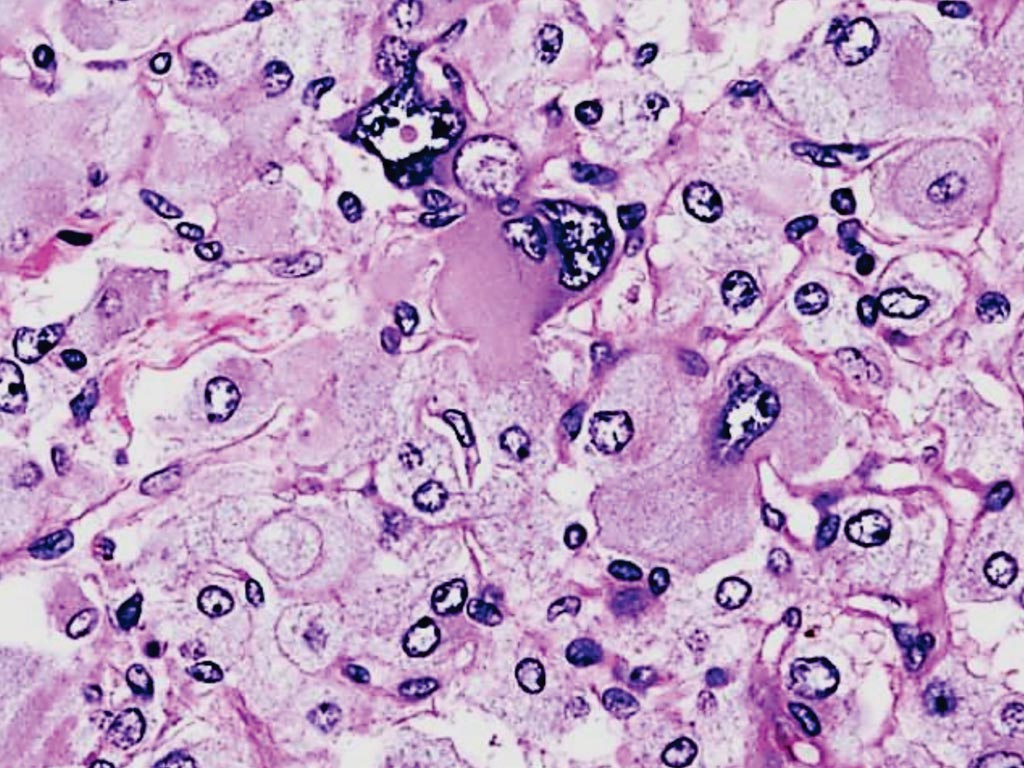Mutations Related to Hereditary Neuroendocrine Tumors
By LabMedica International staff writers
Posted on 16 Aug 2017
Pheochromocytomas and paragangliomas are rare neuroendocrine tumors with a strong hereditary component and half the genes whose alterations confer hereditary susceptibility to develop this condition code for enzymes involved in the Krebs cycle.Posted on 16 Aug 2017
Approximately 40% of patients diagnosed with pheochromocytomas (PCC) or paragangliomas PGL), considered to be the same condition but affecting different parts of the body, harbor a germline alteration in susceptibility genes related to these diseases.

Image: A histopathology of adrenal pheochromocytoma from an adrenectomy specimen showing the characteristic stippled (finely granular) chromatin (Photo courtesy of Nephron).
A large group of scientists working with the Hereditary Endocrine Cancer Group (Madrid, Spain) selected tumor samples that showed the characteristic pattern of hypermethylation but, however, did not have any of the known mutations. They used downregulation and methylation of Retinol Binding Protein 1 (RBP1), as a marker of a hypermethylation phenotype, to select eleven pheochromocytomas and paragangliomas for targeted exome sequencing of a panel of Krebs cycle-related genes. Methylation profiling, metabolite assessment and additional analyses were also performed in selected cases.
The team performed massive sequencing of all of the genes implicated in the Krebs cycle and to the study of the cycle's intermediaries and of the methylation profile of the tumors, and have identified several susceptibility genes associated with a risk of developing these pathologies. The team showed that the presence of a germline mutation in the glutamic-oxaloacetic transaminase 2 (GOT2) gene, found in a patient with nine tumors and metastasis, gives rise to increased activity of the encoded enzyme.
Furthermore, the authors describe extraordinarily rare mutations in two patients: one epimutation in the succinate dehydrogenase complex subunit C, (SDHC) gene and another in the isocitrate dehydrogenase 1 (IDH1), the third to be identified in this gene. Finally, by way of an extension study focused on more than 60 patients with these neuroendocrine tumors, a new susceptibility gene, isocitrate dehydrogenase 3 (NAD(+)) beta (IDH3B), associated with the development of paragangliomas was identified.
Alberto Cascón, PhD, the lead author of the study, said, “The identification of mutations in Krebs cycle genes is especially important given that the patients harboring them have a greater likelihood of developing metastasis.” The authors concluded that their study further attests to the relevance of the Krebs cycle in the development of PCC and PGL, and points to a potential role of other metabolic enzymes involved in metabolite exchange between mitochondria and cytosol. The study was published July 18, 2017, in the journal Clinical Cancer Research.
Related Links:
Hereditary Endocrine Cancer Group













